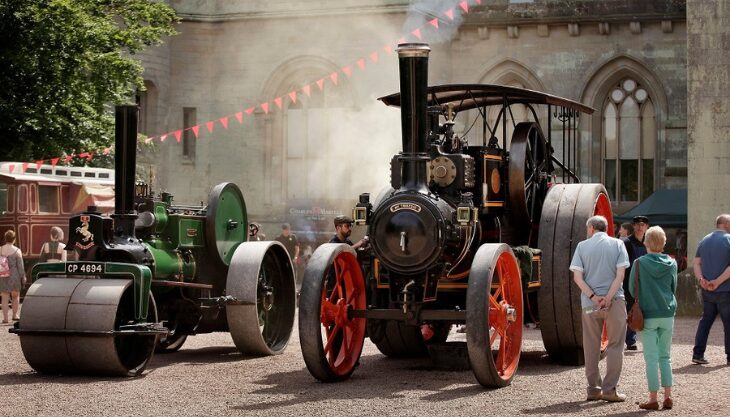
Holiday Expresses at the Gloucestershire Warwickshire Steam Railway
Join us for our special days in August as we re-create the Holiday Expresses of a bygone era. There will be 2 steam trains operating, with Train 1 on the timetable carrying the special headboard all day. This is your chance to close your eyes and imagine you have been whisked back to the age of summer holiday expresses to the seaside. Normal ticket prices will apply and our normally accepted vouchers will be valid.
Our Holiday Express trains will operate on:
Wed 2 August – The Devonian
Wed 9 August – The Cambrian Coast Express
Wed 16 August – The Atlantic Coad Express
Wed 30 August – The Cornishman
ABOUT THE TRAINS
The Devonian
The LMS operated the southbound ‘Devonian’ from Bradford, departing at 10:25 and arriving at Bristol Temple Meads at 15:32, where the through coaches were handed over to the GWR for onward haulage to Paignton and Kingswear. En route, the train would have picked up a Newcastle-Bristol through coach and dropped off a Bradford-Bournemouth one. The journey time between Bradford and Kingswear was around nine hours, and covered some 330 miles.
The northbound ‘Devonian’ was essentially the reverse of the southbound train with the GWR hauled service departing Paignton at 09:15 (on Summer Saturdays the train started from Kingswear at 08:45) and arriving at Bristol Temple Meads at 12:11. From here, the train was handed over to the LMS for onward haulage to Bradford. Operating cross-country, the train was required to tackle the Lickey Incline, which necessitated a stop at Bromsgrove to attach a “banking” engine to assist with the ascent.
The named train was suspended during the Second World War but was reinstated on the 23rd May 1949, lasting until 1975. The train was then revived once again during 1987 and continued until 2002. Records indicate that ‘The Devonian’ name was not derived from the main express (which terminated at Bristol), but in fact from one of its through portions.
This is one of the endless processions of holiday expresses to be seen at this ideal location on Summer Saturdays, which reached their zenith in 1955. The ‘Devonian’ ran daily (not Sundays) from Paignton (dep. 09.15; on Saturdays, Kingswear 08.45) to Bradford Forster Square (due 19.00), via Bristol, Birmingham, Sheffield and Leeds: on Saturdays the stop at Bristol Temple Meads was missed and the changeover to LMR working was made on the St Philip’s Marsh Loop. The train has just emerged from Kennaway Tunnel, the last of five under the headland between Teignmouth and Dawlish – often referred to collectively as ‘Parson’s Tunnel’ after Parson’s Rock.
The Cambrian Coast Express
The origin of the train dates from the early 1920s when the GWR operated a through express service during the summer of 1921. The ‘Cambrian Coast Express’ named train was officially introduced in 1927 with the service operating on summer Fridays and Saturdays. Towards the end of the 1930s the through train only operated on summer Saturdays.
Station stops along the route also included: Leamington Spa, Birmingham Snow Hill, Wolverhampton Low Level, Welshpool, Newtown, Machynlleth, Dovey Junction and Borth.
Following the end of World War II, the Cambrian Coast Express was re-introduced on Saturdays and its seasonal operation continued into nationalisation under British Rail (BR), which included through coaches to Aberystwyth and Pwllheli. By the mid-late 1950s the train operated every day during the year except on Sundays. Steam haulage of the Cambrian Coast Express ended in 1965, with our very own Manor Class No. 7820 Dinmore Manor having the honour of hauling the last regular steam hauled service.
The Atlantic Coad Express
The “Atlantic Coast Express” – affectionately known as “ACE” by enthusiasts and travellers -was the principal express train of the Southern Railway (SR) from London Waterloo to the West Country. The train operated between July 1926 and September 1964 and, at its height, served no less than nine different destinations in Devon and Cornwall, including Plymouth, Bude, Ilfracombe and Padstow.
The “ACE” was originally known as the “North Cornwall & Bude Express” which ran from 1907, until a publicity drive in 1926 saw the 11 o’clock from Waterloo to the West Country renamed. The new name came about from a list of entries invited from employees of the Southern Railway through the staff magazine. The winning entry was submitted by Mr F. Rowland, a guard stationed at Woking who won a prize of three guineas.
The train had its origins in the post-World War 1 period when the Southern Railway was seeking to compete with the Great Western Railway with services to the West Country. At the time there was also competition in terms of road coaches and the private motor vehicle. In terms of operational frequency, the number of “ACE” services varied considerably during the year. In the winter months a single train was usually all that was required, however, at the height of the summer holiday season, the express could be formed by as many as five difference departures from London Waterloo between 10am and 11am.
Services continued in much the same pattern until the outbreak of World War 2, which necessitated longer trains and substantial deceleration on all lines, rendering named trains no longer appropriate. When the hostilities ended, the Southern Railway took no time in reintroducing its most prestigious express. The service reached its Zenith in the 1950s when the Bulleid Pacifics brought increased speed operation, improvements in reliability and time keeping, and in addition,the first timetabled mile-a-minute schedule. The Merchant Navy class Pacifics operated services between Waterloo and Exeter Central, with the lighter West Country and Battle of Britain classes operating on the branch lines beyond. Gradual improvements in schedules continued until the final acceleration in autumn of 1961, when the journey time from Waterloo to Exeter Central came down to 2 hours 56 minutes.
In common with lines across the country, the 1960s were a period of steady decline for services to the West Country as private car ownership increased. From June 1963 the Bude, Torrington and Plymouth through carriages were withdrawn except on summer Saturdays. The remaining services survived through until the following summer. The final “Atlantic Coast Express” departed Padstow on the 5 September 1964.
The Cornishman
The origin of ‘The Cornishman’ dates back to the time of Isambard Kingdom Brunel’s broad gauge. The train first operated in the summer of 1890 leaving Paddington at 10:15, calling at Bristol, Exeter, and Plymouth before finally arriving at Penzance at 19:50. At the time, it was the fastest train service to the West of England with a journey time of 8 hours and 35 minutes – this being 10 minutes faster than another named passenger train – ‘The Flying Dutchman’. ‘The Cornishman’ is particularly notable for reportedly being the last broad gauge express train to leave London for Cornwall on the 20th May 1892.
In broad gauge use, the train was typically hauled by the William Dean designed 3501 Class of steam locomotives over the section through South Devon. The rolling stock consisted of four-wheeled coaches. From its inception right through to British Rail operation, ‘The Cornishman’ was an extremely popular service.
With the Great Western Railway (GWR) operating standard gauge by 1895, ‘The Cornishman’ was the first train to run non stop between London and Bristol. By 1903, the train could reach Bristol in just 2 hours. In July 1904, ‘The Cornishman’ was replaced by a new express passenger train under the name of ‘The Cornish Riviera Express’ (sometimes referred to as ‘The Cornish Riviera Limited’). ‘The Cornishman’ name was not used again until it was reintroduced in the summer of 1935 for a relief to the Cornish Riviera, which departed Paddington at 10:35. The return of ‘The Cornishman’ was brief as by the summer of 1936, the famous named train operated anonymously and on Saturdays only.
With the Second World War approaching, ‘The Cornishman’ would not operate for another 16 years.
In 1952, ‘The Cornishman’ was resurrected by the Western Region of British Railways with the named train operating for the first time under BR on the 30th June. Unlike the pre-War train with the Great Western Railway (GWR) which operated from Paddington, the new service operated from The Midlands starting at Wolverhampton Low Level. The restaurant car service called at Birmingham Snow Hill, Plymouth and Penzance, operating via Stratford-upon-Avon, Cheltenham Malvern Road and Bristol Temple Meads. The train included a portion for Taunton, Torquay and Kingswear.
In 1962, the northern section of ‘The Cornishman’s’ route was altered with changes taking effect from the Winter 1962 timetable. The train no longer operated along the GWR route between Honeybourne and Cheltenham, instead running via the former Midland Railway route from Birmingham to Gloucester via the Lickey Incline. North of Birmingham, the train operated over the route to Derby and Sheffield and by 1967, starting locations for ‘The Cornishman’ included Bradford Exchange and Leeds.
In the early 1970s, ‘The Cornishman’ operated from Leeds on weekdays and from Bradford on Saturdays, which included a stop at Wakefield Westgate along the route.
* Our trains are old, and sometimes need replacing for a different service at short notice.
Road Direction
Toddington Station GL54 5DT.
what3words puzzles.throats.expectant
Winchcombe Station GL54 5LD
what3words address is curries.dwarves.blotchy
Cheltenham Racecourse Station GL50 4SH.
what3words hobby.rates.stray
Broadway Station WR12 7DF.
what3words reworked.frog.canyons
Public Transport
Cheltenham Spa can be reach via the national rail network and stagecoach operate the D and E buses to Cheltenham Racecourse regularly.
Stagecoach run the W bus service stopping at Broadway, Toddington and Winchcombe.
NN Creswell operate a bus to Broadway from Evesham and Stagecoach Midland operate a service to Broadway from Stratford-upon-Avon.
Winchcombe station can be reached by the 606 bus operated by Pulham’s from Cheltenham to Chipping Camden, this stops at Winchcombe, Toddington and Broadway.
Tickets: Adult £25
Child: £10
Family: £60

